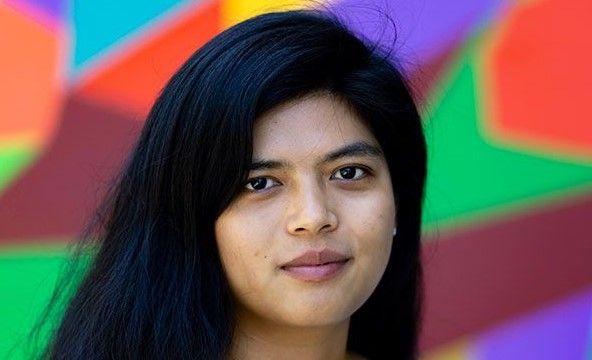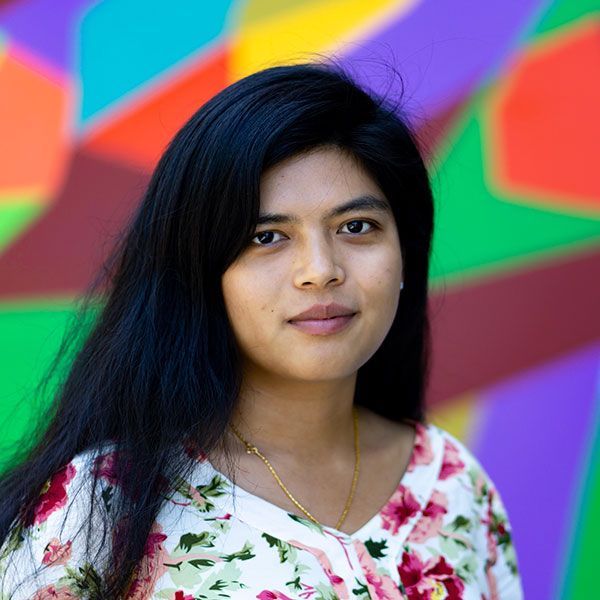Fresh Faculty: Thirii M. Myint


Q: How did you become interested in writing?
A: Well, I always wrote when I was a kid. Growing up, I would write stories [and] make up stories that I didn’t write down. But I didn’t really consider it as a career or as something I could pursue as an adult until I was in college and I took a creative writing class. I actually took one just as an elective my freshman year, and I really fell in love with the format of the class. I ended up changing my major and becoming a creative writing major. So I do have my professors to thank, because they kind of opened my eyes to the possibility of pursuing [writing] as an adult.
Q: Are you currently writing anything? How did you become interested in the topics that you’re writing about?
A: I had a book come out earlier last year in the fall, and I’m kind of in between projects right now. I’m starting a new project, but it’s very new, so I feel a little superstitious talking about it as a book. I usually don’t think of my writing in terms of books until at the very last minute when that’s clearly what it is, because I don’t really want to jinx it. And I think it’s not helpful for me to think of my writing in terms of really big projects and also in terms of publication, because it adds a lot of stress. But I am writing shorter pieces too on the side, which is always helpful to take off the stress on a big book project.
Right now, I’m writing an essay about Amherst, actually, but really more about naming, and the birth of my child, and realizing that [Amherst] is going to be his hometown. [The piece] is going to be part of this anthology on belonging, place, and identity.
Q: You’ve written two books previously. What was the inspiration behind each of them?
A: I think inspiration is a mysterious thing. It’s not always super clear what inspires a project — I think that projects are complicated and living and changing, and books take years to write. And so within that time period, there’s a lot of different inspirations that change the project and that move the project forward. But I can talk about the initial ideas or excitement that got me started on my projects. The first book — which is my novel, “End of Peril” — I consider sort of a post-apocalyptic novel, because at the time that I was writing it, there was a resurgence of interest in post-apocalyptic narratives, in popular culture and also in literature. Something about that didn’t really speak to my experience, because I felt like a lot of the post-apocalyptic narratives were set in America or other industrialized countries, and it was always about this future apocalypse, like, “Oh, what would happen if there was a natural disaster that happened in New York or San Francisco or whatever in America?”
I was trying to figure out why that didn’t sit well with me, and I think I came to the idea that it’s because for a lot of the world, for many people living in the world, the apocalypse actually happened already in the past. Industrialization, colonialism, and imperialism — those were big apocalypses for my ancestors, and the world as they knew it already ended generations ago. So we’re already living in the post apocalypse. And actually, even in the current world that we live in, environmental change is already impacting a lot of people. It’s just not impacting the people in power, or [people] with privilege and money. So they can kind of push the apocalypse back into this temporal future, but it’s actually in the past and present that [the apocalypse] is happening. I wanted to write a novel that would capture the reality of that, [so] that was the original idea for that novel.
My second book is a work of nonfiction. I really did not want to write nonfiction, because I’ve never done it. I guess I was scared to do it. But I think that I ended up doing it because I was taking this class in graduate school called “Documentary Poetics,” and it was about reading poets who did archival research, or documentary research, and wrote about that in their writing. And that was a really interesting concept approach for me, because I usually just worked from imagination or from reading other works of literature. It was exciting to me to think about using archival research as a basis for creative work. My professor also talked about [the concept of] the body as an archive, so I was interested in interviewing my parents who grew up and lived in Burma their whole lives under dictatorship. Through those interviews, I became really interested in my family stories, and I felt like I wanted to document them. At the beginning, [I wanted to do it] just for myself and for my family, but slowly it kind of grew to something that I realized was more like a book project for a general audience. That’s sort of the beginning of that book.
Q: How did you end up coming to Amherst?
A: Amherst was actually my first job out of graduate school. I came here as a visiting writer, which was supposed to be a three-year renewable gig. In the English department, they have visiting writers come every few years, and then they’ll leave and new people come. We came here — my husband and I — and we really loved it here. We really liked the department, we really loved the students, we loved the town. But I didn’t think I could stay because I was in a visiting position, so I went on the job market last year with the blessing of my department. I got an offer at another institution, and so did my husband, and we were going to take it and move. But at the last minute, Amherst had a counteroffer, which was unexpected but really amazing. Since we loved it here so much, we made the last-minute decision to stay. It was not a traditional route for sure — we really didn’t think that we would be staying here when we first came here, but we’re happy and lucky to be here.
Q: How was your first semester teaching at Amherst?
A: It was an adjustment, but it was great. I was really, really impressed by the students, and that was my main experience. I just loved the Amherst students and how excited they were, and how hardworking they were. And I didn’t have to do any of the parts of teaching I dislike, like being a disciplinarian. But aside from that, the department was great and the students were great. It was an adjustment because I had been a graduate student for such a long time. To be honest, when I first came to Amherst, it was really hard to deal with the new sort of privilege and access of opportunity and time that I had. I think that it’s taken me a while to adjust to that and take advantage of it without feeling guilty. It’s definitely hard to go from being a graduate student and living paycheck to paycheck to suddenly having privilege and power, and learning how to deal with that and use it responsibly and generously with students and others while still having boundaries.
Q: As the spring semester begins, what’s something you’re looking forward to?
A: It’s kind of weird for me, because when you ask about my first semester, it wasn’t last semester. Last semester, I was on leave because I just had a baby, even though that was technically my first semester as a tenure-track hire. My first semester here was two years ago, so technically, the spring is going to be my first semester as a tenure-track hire, but it’s actually my fifth semester teaching at Amherst. So I’m in a slightly different situation for that reason, because I do feel really comfortable here already, and I kind of know how Amherst College works. But I do think that being on the tenure track changes things a little bit, and having a child changes things a little bit.
I’m teaching two classes I’ve taught before, but I’m really taking into account student feedback I got on those classes. They’re classes I taught when the pandemic happened and everybody was sent home, and I think I learned a lot during that semester about accessibility, and how to responsibly accommodate students that I don’t want to lose just because we’re returning to in-person classes. I want to make my classes accessible and fair to everybody. And for me, that includes moving beyond giving students letter grades on their projects and papers, because I don’t think that I, as a single person, should be responsible for passing judgment or things like that. I’m really working on ways to integrate self-grading and contract grading into my syllabuses, so that we’re measuring student progress and goals. The other thing I’m trying to implement is from my creative writing courses. In my creative writing courses, I always hold workshops where students get to give peer feedback to each other’s work, and I’ve decided to try doing that in my literature courses this semester as well.
Q: To close out the interview, if the pandemic was suddenly over today, what’s the first thing you would do?
A: Oh my gosh. I would fly across the country and see my parents and have them meet my son. They met him when he was born, but they haven’t seen him in eight months.